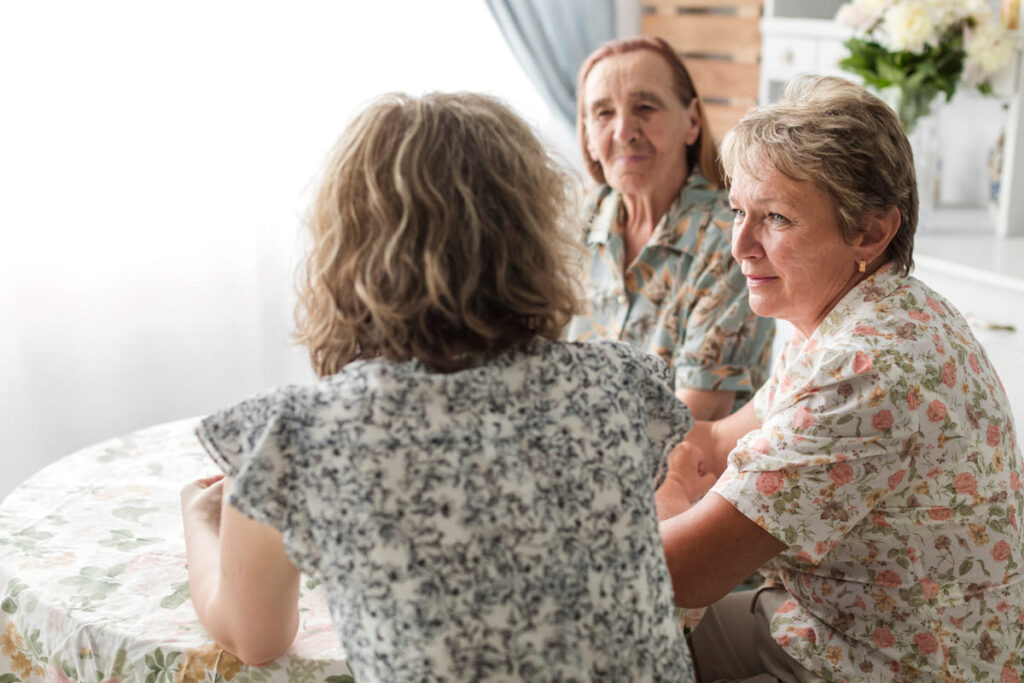12 Conversations Older Women Should Have With Eachother More Often
As you get older, some conversations tend to become less frequent, even though they hold significant importance. Many topics that could bring clarity, comfort, or connection often go unspoken among older women.
This article highlights key conversations you should have more often to enrich your relationships and well-being. Having these talks can help you navigate changes and share valuable experiences with others in your life.
Discussing the importance of adapting to technology

You might feel overwhelmed by new technology sometimes, but embracing it can make your life easier. Learning to use smartphones, apps, or social media can help you stay connected with friends and family.
Technology also offers tools to manage health, finances, and hobbies more efficiently. Taking small steps to adapt will boost your confidence and keep you engaged with the world around you. Don’t hesitate to ask for help or take a class if you need it.
Sharing experiences of ageism and how to handle it

You might notice ageism showing up in subtle ways, like being overlooked or talked down to. Sharing these moments with others helps you feel less alone and more understood.
Talking about how you respond builds confidence. You can exchange tips on setting boundaries or correcting assumptions politely and firmly.
Remember, your experiences matter. Opening up creates space for support and change.
Talking openly about health screenings and preventive care

You should feel comfortable discussing health screenings with your friends and family. Regular check-ups help catch problems early before they become serious.
It’s important to remind each other about recommended tests like mammograms, bone density scans, and cholesterol checks. Sharing your experiences with doctors can make the topic less intimidating. Staying proactive about your health empowers you to make better decisions.
Reflecting on changing friendships over time

You may notice that your friendships change as time goes on. Some friends drift away while others become closer.
It’s normal for your social circles to shift with new priorities and life stages. You might find yourself valuing different qualities in your friends now.
Talking about these changes can help you understand your feelings and appreciate the friendships that remain. It’s okay to let go of some connections and nurture others.
Exploring new hobbies or skills to try

Trying new hobbies can bring fresh energy to your days. You might discover a talent you didn’t know you had.
Consider simple activities like gardening, painting, or cooking a new recipe. These can be relaxing and fun.
Learning a skill, such as a language or digital tools, keeps your mind active. It’s never too late to start something new.
You can also join local classes or groups to meet people with similar interests. This expands both your skills and your social circle.
Conversing about retirement dreams and planning

You might find it helpful to talk about your retirement dreams openly. Sharing your hopes and concerns can clarify what you want next in life.
Discussing practical steps like savings, healthcare, and living arrangements is important. It can ease worries and create a clearer path forward.
These conversations can also inspire you to explore new activities or goals. Retirement isn’t just an ending; it’s a chance to embrace fresh possibilities.
Addressing the challenges of caregiving for aging parents

You may find caregiving to be physically and emotionally draining. It’s okay to acknowledge that it can sometimes feel overwhelming.
Talking openly about the support you need can help lighten the load. Sharing responsibilities with siblings or professional caregivers can make a big difference.
Remember, taking care of yourself is just as important as caring for your parents. Your well-being matters in this journey.
Discussing financial literacy and estate planning

You might find talking about money and planning your estate uncomfortable, but it’s important. Understanding your finances helps you make confident decisions for your future.
Having conversations about budgeting, investments, and retirement plans can clear up confusion. Estate planning ensures your wishes are respected and can prevent stress for your loved ones.
Don’t hesitate to ask questions or seek advice from professionals. These talks can empower you to manage your money wisely and protect what you’ve worked hard to build.
Sharing stories about dating or love after 50

You might feel hesitant to talk about dating at this stage, but sharing your experiences can be freeing. Your stories about love after 50 help others understand what it’s like to start over or try something new.
Talking about both the successes and the challenges shows that this phase is normal and real. Your honesty can inspire others to be open about their own journeys.
Talking about body image and self-acceptance

You might find it hard to talk openly about how your body changes with age. But sharing your experiences can help you and others feel less alone.
Accepting your body as it is doesn’t mean giving up on health. It means treating yourself with kindness and respect, no matter the shape or size.
When you discuss self-acceptance, you give yourself permission to focus on what makes you feel strong and happy. This conversation can shift your mindset for the better.
Discussing mental health and coping strategies

You might find it helpful to talk openly about your mental health. Sharing your feelings can reduce stigma and create a supportive space.
Discuss what coping strategies work for you, like meditation, exercise, or connecting with friends. It’s okay to try new methods to see what fits your needs best.
Remember, mental health is just as important as physical health. Encouraging these conversations can improve your well-being and inspire others to do the same.
Exploring travel destinations suited for older women

You might enjoy destinations that offer a mix of relaxation and gentle activities. Places like coastal towns or cultural cities can provide both calm and engaging experiences.
Consider locations with good healthcare access and easy transportation. This helps you feel secure and comfortable during your trip.
Group tours tailored for older travelers can be a great option. They often focus on slower-paced, enriching experiences.







